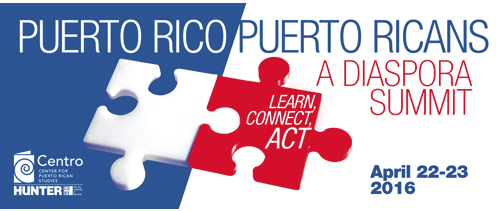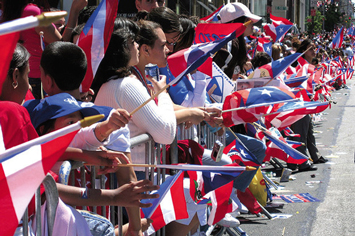Island Suffering Is Focus Of Puerto Rican Diaspora Conference
By Michael Z. Muhammad -Contributing Writer- | Last updated: Apr 28, 2016 - 10:06:12 AMWhat's your opinion on this article?

Puerto Rican-Americans display their island flag during a gathering to bring attention to their Diaspora and struggle for self-identity. Photo: as-coa.org
|
Politicians, journalists, clergy, lawyers, economists, social workers, educators, environmentalists, teachers and health care providers came together to explore solutions to the critical problems facing the Puerto Rican community at a weekend gathering.
The “Puerto Rico/Puerto Ricans: A Diaspora Summit” examined the humanitarian crisis on the island and focused on the impact it has had on Puerto Ricans living in the United States.
The conference was held on April 22-23 at Hunter College and sponsored by the Center for Puerto Rican Studies (Centro). Sessions were webcast.
The summit featured panels and breakout sessions on topics such as health, economics, political participation, and community development. Participating organizations shared information about their work. The Friday morning April 22 discussions were devoted to an understanding of the current economic situation in Puerto Rico. The afternoon program addressed an understanding of how the economic crisis in Puerto Rico has impacted the stateside Puerto Rican community. The closing program focused on ongoing efforts to articulate a Diaspora response to the crisis, an agenda for stateside organizations to move forward with coalition building, and in that context, a discussion of the role that Centro may play in the future.
The magnitude of the crisis confronting the Puerto Rican community is huge. According to a recently published article, “Ending Puerto Rico’s Economic and Humanitarian Crisis,” “As a result of bad fiscal policy and mismanagement over the course of decades, Puerto Rico has racked up $72 billion in debt to creditors, the payments for which are simply too high to repay. To address this fiscal crisis, Puerto Rico has begun taking drastic measures, including: More than 150 public schools have closed, a hospital had its electricity temporarily shut off by the power company, because it couldn’t pay its bills, the island’s only children’s hospital lacks proper equipment and staff, first responders can’t afford the fuel they need for their emergency vehicles, Puerto Rico is increasing the retirement age, delaying tax refunds, and slashing spending.” Worst of all the professional class is leaving the island in droves.
The island, many say, is at a real crossroads split between those who want independence, those who want to stay a U.S. commonwealth and those who want the island to become a state.

|
According to Maru Gonzalez a scholar-activist, educator writing for the Huffington Post, the only answer to the crisis is full independence. “Puerto Rico’s serious and worsening economy is largely rooted in its colonial status. Statehood is a pipe dream. Other nations have proved that independence is possible and lastly, an independent Puerto Rico would more readily protect the welfare and the rights of its people than the United States,” Ms. Gonzalez states. “Puerto Rico lacks any real autonomy or representation, these and other travesties—both social and economic—are largely ignored. Independence would hold accountable elected representatives at all levels of government and restore power to the people.”
In an article published in the Cornell Review, “Puerto Rico’s Debt Crisis Revives Debate on Statehood,” the Puerto Rican Statehood Society argues statehood would address the “poverty [that] is the result of the current colonial status, where the U.S. citizens of Puerto Rico do not have equal rights. … Statehood would mean that they will have the same access to federal support and tax relief programs … [and in the way] every single territory that has gained admission to the Union [so too will Puerto Rico].”
Those who want to maintain the status quo are calling for Chapter 9 bankruptcy protections, and reversing austerity measures as outlined in President Obama’s recent proposal to Congress.
Wanda Rivera, a community activist and child welfare social worker offered a keen observation when speaking to The Final Call. “I have a lot of relatives who have left the island in droves. I have very few relatives left in Puerto Rico because of the economic situation, the lack of jobs, high taxes, high utility rates. It’s a tragedy.” Ms. Rivera believes the real problem lies in the economic structure. “We don’t have real economic freedom to be able to do business and that’s a problem,” said Ms. Rivera. She said the situation is complicated as many Puerto Ricans have American values but want to keep their own identity. “It’s a difficult situation. We were under Spain for 500 years, under United States rule since 1898,” she noted.
“The dilemma for the Puerto Rican people is how do you make a decision to address the crisis when you are not free to make a decision?” she said. For Ms. Rivera there is a crisis of leadership on the island. “We don’t have a transformational leader and that’s what the country needs. Somebody that can unite us.”
David Muhammad, a Puerto Rican and member of the Nation of Islam, offered this perspective: “As Diaspora Puerto Ricans here in the United States can advocate for those on the island, it’s debt should be forgiven. It was imposed unjustly. Puerto Rico’s interests were managed and mismanaged by those who served the monied interests of the United States and not the Puerto Rican people. The voice of Puerto Ricans in the United States has to become louder and connected to the interest of our people on the island.”
Mr. Muhammad told The Final Call the major problem is the lack of self-determination given the people and its colonial status.
“We have to demand a new future for Puerto Rico working with love and giving our resources to the people on the island. Statehood will never happen. It’s an island of people of color. The only road is the one of self-determination. Currently no goods or services can be imported into the island unless it comes from the mainland United States. The only way forward is independence,” Mr. Muhammad said.
INSIDE STORIES AND REVIEWS
-
-
About Harriett ... and the Negro Hollywood Road Show
By Rabiah Muhammad, Guest Columnist » Full Story -
Skepticism greets Jay-Z, NFL talk of inspiring change
By Bryan 18X Crawford and Richard B. Muhammad The Final Call Newspaper @TheFinalCall » Full Story -
The painful problem of Black girls and suicide
By Charlene Muhammad -National Correspondent- » Full Story -
Exploitation of Innocence - Report: Perceptions, policies hurting Black girls
By Charlene Muhammad -National Correspondent- » Full Story -
Big Ballin: Big ideas fuel a father’s Big Baller Brand and brash business sense
By Bryan Crawford -Contributing Writer- » Full Story






 Click Here Stay Connected!
Click Here Stay Connected!








